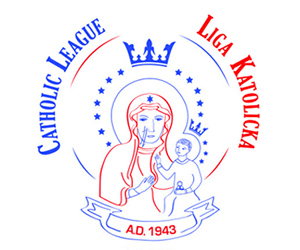
Ks. Mateusz Kozłowski
The family, as we all know, is the basic social cell. It is also a great idea of God. All this is done in a marriage, so we should not have any doubts as to how the preparation for this marriage plays a key role. Let’s look a bit at this topic too. This is important because it begins in the teenage years of a person’s life and is reflected in later life, an adult.
From his very destination, marriage should lead to the salvation of man. All this is related to the God’s plan implemented in the lives of people. By the divine plan, we are able to achieve eternal life. This is completed when a man and a woman have a sacramental marriage. By baptism the person is included in the covenant, into a new life with Christ. Just because of how pap writes. John Paul II in his Post-Synodal Apostolic Exhortation ,, Familiaris consortio “, because of a special union with Christ, this marital bond, which God established, is exalted and enriched by the saving power that man experiences.
One should continue the work of nature prepared for man, which is realized through the sacrament of marriage. All relationships, interpersonal relationships can not be matched by marriage, therefore for every baptized person marriage will always be a sacrament and it is inevitable. It is the family that is the smallest saving community where the Creator’s plans and senses are realized. Through the tasks and work they do, they become a sign of Christ’s presence in the world. The family is also the basis of society. As Bishop D. Zimoń wrote: “this is one of the greatest ideas of God.” However, one should not forget that in order to be able to fulfill these conditions, one must live according to what Jesus left us, his teachings and commandments. Everyone is willing to commit sins. Therefore, all tasks resulting from the foundation of a family should be implemented in cooperation with God’s grace, prayer and trust in Christ. Through this, you will be able to do what the Creator has predestined us to do. This is very difficult at the present time, but not impossible to do. Pope John Paul II wrote: “the family in present times is under the influence of extensive, deep and rapid social and cultural changes. Many families experience this state of affairs, remaining faithful to the values that form the foundation of the family institution. Others became uncertain and lost to their tasks, and sometimes even doubted and almost lost their awareness of the ultimate meaning and truth of marriage and family life. Others, as a result of injustices, face obstacles in the exercise of their fundamental rights. ” God wants us to live in true love, not only with Him, but also with another human being. For this reason, he established a community between people, which is marriage, which as an extraordinary relationship, is based on mutual love and respect. Thanks to the family, one learns what Christ’s love really is.
Preparing for a sacramental marriage requires that the fiancés be instructed on Catholic teaching related to marriage. The social, cultural and civilizational changes prevailing in the world have a great influence on the current pastoral practice of the preparation for the sacrament of marriage. That is why it is extremely important to properly prepare people who want to make a sacramental relationship. This task rests largely on the Catholic Church. In order to avoid any difficulties, if possible, appropriate and operative pastoral programs should be chosen to properly prepare nupturants for a very important moment in their lives. It is necessary to teach first of all about the dignity of this sacrament. Elements of this formation should be received by the clients in their families, from early adolescence, so that they can later start their marriage properly. The burden of preparation should rest on priests, but the difficulties can also be supported by lay Catholics. All this requires great responsibility and trust. They should be instructed as much as possible so that their preparation is based on mutual respect and respect for one’s own life and health. Of course, the aforementioned formation received in the family affects this. It is she who is to play a primary role in this matter. Therefore, this preparation often requires tedious and patient work. The church legislature in the Code of Canon Law states that priests have the duty to ensure that the ecclesial community offers help to all believers so that the sacrament of marriage retains its theological meaning. Hence, specific provisions arise, namely, to direct to the faithful appropriate catechesis or homilies, talking about marriage, the appropriate course of preparation, duly and with the dignity of the liturgy of marriage, which is a sign of unity with the Church; and finally to offering help to the married people when they need it. It cannot be that the priest, after blessing the marriage, will not be interested in the future fate of the married. Try to make the life of every new family sacred and perfect.
Preparation further
Further preparation begins during childhood. It is meant to include small children, then older people and young people. Therefore, proper family formation is necessary here. Parents should familiarize their children with the world around them, teach them how they should function in it. The child should learn about his nature and personality. It should also be instructed that respect should be given to every human being in interpersonal relations. This should create a character, thanks to which he will later know how to proceed when making acquaintance with a person of a different gender. In the case of Catholics, it is extremely important to prepare both spiritual and catechetical. The preparer should realize that marriage should be treated as a kind of vocation or mission. This teaching should not obscure the eventual devotion to God’s service by entering a young person into a seminary or a religious institute. The described education, especially in the context of school catechesis or other religious meetings, should be characterized by content appropriate for young people. By learning the very pronunciation of sacramental marriage and responsibilities.
One must not overlook the very important aspect of the young person’s worldview. A brave attitude towards various life’s adversities should be accepted; a mature Christian cannot give in to them. Nupturient should remember about the basic duties that rest on him. Formation is to be carried out in such a way that the character and mentality of young people, who would recognize the unity and indissolubility of sacramental marriage, oppose various aspects of social sin. He wrote pap about social sin. John Paul II in the Post-Synodal Apostolic Exhortation, “Reconciliatio et paenitentia”: “the Christian lifestyle”, adopted in the family, will be a good form of preparing the child for marriage and staying in it. The family home, where the values that our Lord Jesus Christ has left us, will be a perfect example of a proper life. Parents should support pastors through catechesis, at all levels of education. Basic information should be provided about shaping the right virtues related to later family life. It is recommended that at older years of primary school they should oblige the catechesis on marriage even to lay people, provided they are properly prepared for this task.
During further education in high school, it is recommended to continue the Christian formation. Young people should explore this content. In the event of any formation deficiencies in this area, they should be duly completed. This task rests on catechists or teachers. It is welcome to conduct any discussions with young people regarding marital or family subjects. Answers to questions can have a huge impact on the decisions of young people, so you need to refer to them axiologically. It is recommended that young people read the relevant literature to learn more about this sacrament. Young people, from their childhood years, should be instructed by their family about the essence of Christian love. They need to know how to properly refer to the sphere of chastity so that in the future they can dignifiedly survive the condition of their betrothal and then marriage.
Closer preparation
A much wider range of activities includes a closer preparation that takes place during the survival of the engagement, taking the form of participation in courses. It has a slightly different character than direct preparation for the sacrament of marriage, because it provides for meetings in a sense, for a moment, just before the celebration itself. In the course of closer preparation, it is recommended to analyze how the fiancés understand issues related to basic human values. Dialogue, joint conversations, friendship or camaraderie are taken into account here. An important element influencing the preparation is the faith dimension of the brides. Before the young man, there is a perspective of living for two for good and for bad. Therefore, one should refer to the problem of sacramental life, because it is a stage of a kind of evangelization. It is important that the fiancés learn if they cannot yet live a faith every day, which cannot be lost. Through these activities, you can easily identify potential difficulties in matters related to experiencing the faith. The period of the worldview about the faith coincides with the period of puberty, which ends around the seventeenth year of life. Youth ministries are responsible for its implementation. However, it should not be limited to this form in any way, thus disregarding the family upbringing, which, like during the further preparation, is of fundamental importance.
Already in the Post-Synod Apostolic Exhortation ,, Familiaris consortio ” Pope John Paul II wrote that closer preparation is characteristic because it has a new way of discovering the whole nature of sacramental marriage before fiancés. It is very necessary for young people to be able to prepare for the sacrament in spiritual and moral terms even better. Because it is to be done taking into account the specific needs that the bride and groom need, it should contain elements that talk about the personal relationship that awaits them, the relationship of two people and the consequences of it. This intimacy is to be constantly developed at a later time of marriage. One must not forget about the issue of responsible parenthood, which should make the engaged couples aware of the basic biological knowledge in this area. Thanks to this, in the future it will be easier for them to find and implement various methods of raising their offspring. It is also necessary to prepare for the proper conduct of family life: for example, proper running of the family budget or stability of employment. This will enable them to acquire the right qualities so that all marital and family functions are performed correctly. One must not forget about the later stages of the relationship, so it should be included in the preparation of a more diverse group of people, or family associations, would be here for the “Home Church”.
Direct preparation
There is also a third stage of preparation for the sacrament of marriage, which is direct preparation. Its very name implies that it should take place immediately before the conclusion of the marriage, that is in the last months preceding the celebration. In the case of finding any deficiencies in the brides, taking into account catechetical education, showing the mystery of redemption, formation referring to the very essence of the sacrament of marriage, or the liturgical context, it can be supplemented to some extent. The general goal of direct preparation is to collect the information presented so far, referring to doctrinal, moral or spiritual matters. It is a good habit to make a proper spiritual preparation before concluding the sacrament of marriage. It is about the days of recollection, or special retreats, intended for brides finished with the sacrament of penance. The theme of these spiritual exercises should be issues related to the marriage itself. You can organize some kind of discussion panels, where the fiancés could talk together, asking questions. All this is to be conducted under the direction of a priest or a faithful lay-person appropriately prepared for it.
Apostolic Exhortation ,,Familiaris consortio” Pope John Paul II states that direct preparation plays a significant and significant role. However, its absence should not be an obstacle to the marriage. The Church, given some events, gives this opportunity. Sometimes there are circumstances when people come to the sacrament, whose disposition is not perfect. Unfortunately, it also happens that the sacrament of marriage itself is made somewhat customary. It’s all about the church ceremony. By its very nature, marriage has a social and cultural character. Not only spouses, but also their families, friends or friends take part in it. The statement is that apart from individual reasons, there are also social reasons for concluding a sacramental marriage. On the other hand, one should not refuse to allow the conclusion of the sacrament of marriage to those who may be primarily concerned with its social character. The mere inclusion in the Church community should be a reason to be able to say that the spouses desire what the Church wishes.
Direct preparation creates an opportunity for the future spouses to become involved in the parish life and in various forms of pastoral care of families. Therefore, priests in preparation should adequately educate brides about this possibility and present them with various parish associations. They are to understand what role lay people play in the Church. This will probably help them in deepening their faith, seeking theological knowledge so that they can live according to the teachings of Christ and raise their offspring in love. In addition, the spouses should bear in mind those virtues characterized by the Holy Family, which is a model for every home. The pastor should emphasize the pastoral nature of the preparation with a view to more frequent joining the sacraments, especially before the marriage (this is the sacrament of penance and reconciliation and Holy Communion).
As we see, preparing for the sacrament of marriage is a kind of preparation for living in a family. Essential elements of family life are raised on various catechesses or homilies talking about marriage. Let us pray all the time for the sanctity of our marriages, for the holiness of our families.







